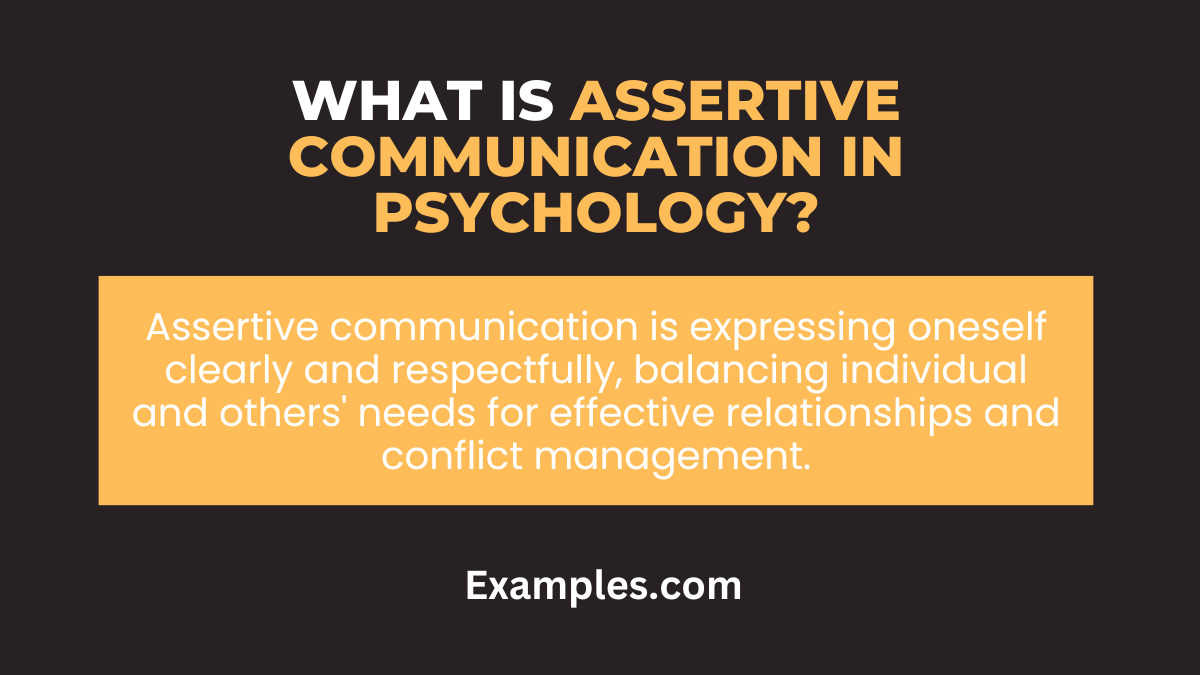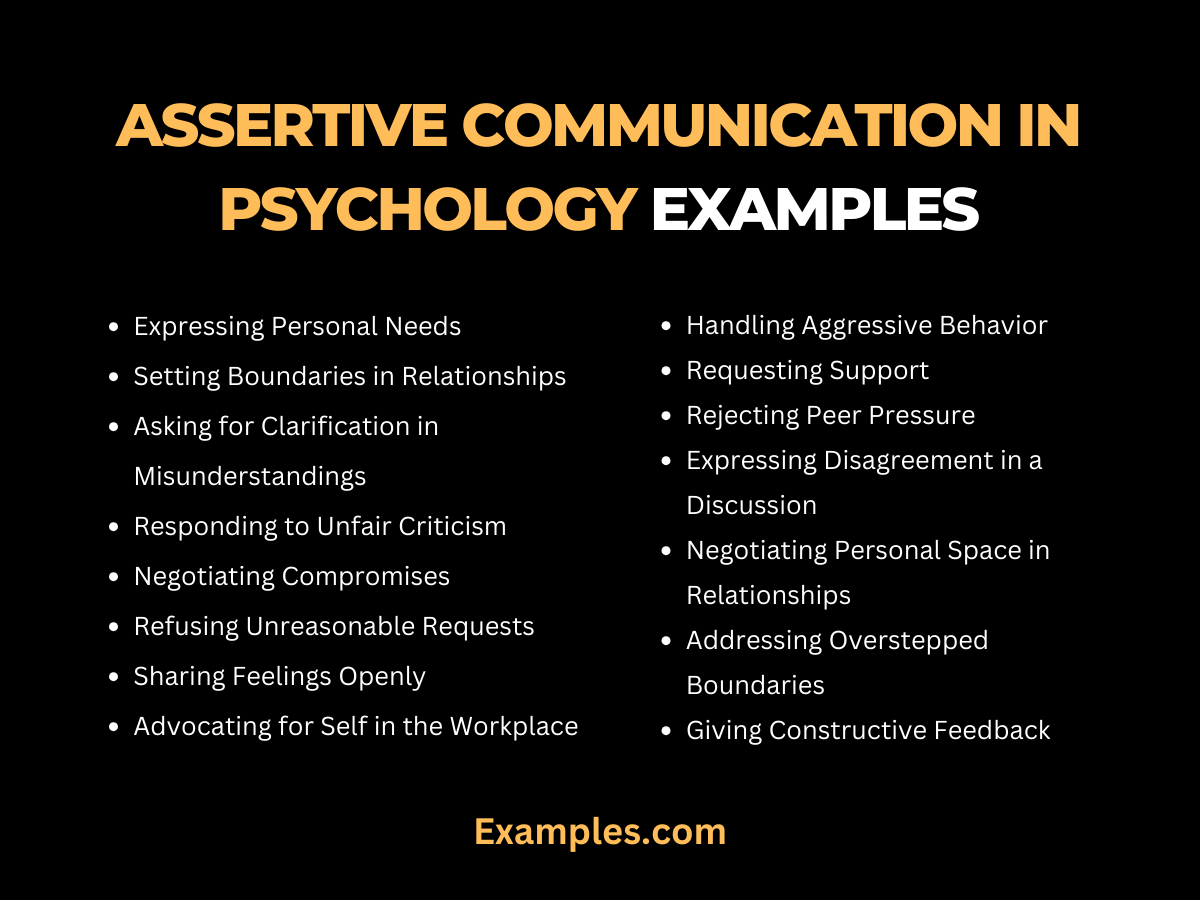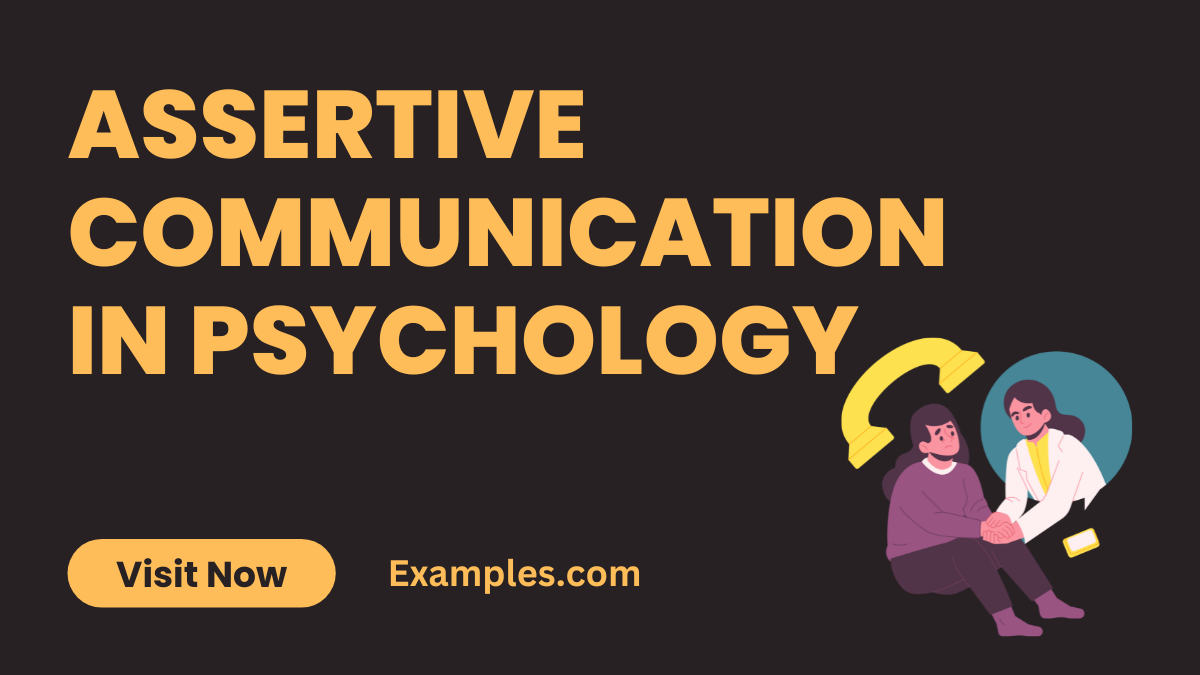14+ Assertive Communication in Psychology Examples
Assertive Communication in Psychology is a crucial element in mastering oral communication. This guide offers a deep dive into assertive communication within the psychological context, providing real-life examples that highlight how to express oneself effectively and empathetically. It focuses on the psychological underpinnings that make assertive communication work, equipping readers with the tools to communicate their needs and opinions in a way that respects both themselves and others.
What is Assertive Communication in Psychology?

In psychology, assertive communication is defined as the ability to express one’s thoughts, feelings, and needs in a clear, honest, and respectful way. It is a communication style that balances the rights and needs of the individual with those of others. This approach allows for open and honest dialogue without resorting to passivity or aggression. It emphasizes the importance of self-expression along with empathy and understanding towards others. Assertive communication is a key skill in building healthy relationships, resolving conflicts, and maintaining personal boundaries, making it a vital aspect of interpersonal and psychological well-being.
15 Assertive Communication in Psychology Examples

Assertive communication in psychology is integral for effective interaction and emotional health. This guide presents 15 unique examples, each illustrating how assertive communication can be applied in various psychological contexts. From expressing personal boundaries to handling conflict with empathy, these examples demonstrate how clear, respectful communication fosters understanding and resolves issues. The scenarios cover a range of situations, offering practical sentences and insights for individuals seeking to improve their communication skills and interpersonal relationships. This SEO and NLP-friendly overview is designed to help readers understand and apply assertive communication techniques in their daily lives.
- Expressing Personal Needs:
“I need some time alone to recharge and reflect.” Assertively stating a personal need for space. - Setting Boundaries in Relationships:
“I value our friendship, but I’m not comfortable discussing my finances with you.” Establishing personal boundaries respectfully. - Asking for Clarification in Misunderstandings:
“I’m not sure I understand your point. Can you explain it differently?” Seeking clarity in communication. - Responding to Unfair Criticism:
“I appreciate your feedback, but I feel it’s not entirely fair in this context.” Handling criticism assertively. - Negotiating Compromises:
“Let’s find a middle ground that works for both of us.” Negotiating to reach a mutually beneficial agreement. - Refusing Unreasonable Requests:
“While I’d like to help, I can’t commit to this as it goes beyond my capacity.” Politely declining an unreasonable request. - Sharing Feelings Openly:
“I feel upset when my opinions are disregarded in discussions.” Expressing emotions honestly and respectfully. - Advocating for Self in the Workplace:
“I believe my contributions in this project merit recognition.” Assertively advocating for oneself in a professional setting. - Handling Aggressive Behavior:
“I understand you’re upset, but let’s discuss this calmly.” De-escalating aggression through assertive communication. - Requesting Support:
“I’m struggling with this task and would appreciate your support.” Asking for help clearly and directly.

- Rejecting Peer Pressure:
“I respect your choice, but I’m not comfortable doing that.” Standing up against peer pressure. - Expressing Disagreement in a Discussion:
“I have a different perspective on this matter. Here’s my viewpoint…” Sharing a differing opinion in a respectful way. - Negotiating Personal Space in Relationships:
“I value our time together, but I also need some time for myself.” Balancing personal space and togetherness in a relationship. - Addressing Overstepped Boundaries:
“I feel my boundaries were overstepped when you made that decision without consulting me.” Addressing boundary violations. - Giving Constructive Feedback:
“Your work is good, but here are some areas for improvement.” Providing feedback that is both constructive and supportive.
Importance of Assertive Communication in Psychology

Assertive communication plays a pivotal role in psychology, significantly impacting mental health and interpersonal relationships. This approach promotes self-expression and mutual respect, crucial for emotional well-being. Understanding the importance of assertive communication in psychological contexts is key to developing healthy interaction patterns. It aids in conflict resolution, self-esteem enhancement, and emotional regulation. This SEO and NLP-friendly summary underscores the critical role assertive communication plays in fostering psychological health, offering insights into its benefits for personal development and social interactions.
- Resolving Conflicts Peacefully:
“Let’s work together to find a solution that satisfies both of us.”
Promoting cooperative conflict resolution. - Enhancing Self-Esteem:
“I am proud of my achievements and will continue to strive for my goals.”
Boosting self-esteem through positive self-affirmation. - Preventing Resentment:
“I prefer to address issues as they arise to avoid any resentment.”
Proactively dealing with issues to prevent negative feelings. - Building Trust in Relationships:
“Honest communication is important to me in building a trustworthy relationship.”
Fostering trust through honest and open communication. - Facilitating Emotional Release:
“I need to express my feelings about this situation to feel relieved.”
Allowing emotional expression for psychological relief. - Improving Decision Making:
“I consider both our opinions to make a well-informed decision.”
Incorporating mutual viewpoints for better decision-making. - Developing Mutual Respect:
“I respect your opinion and ask that you respect mine as well.”
Cultivating mutual respect through balanced communication. - Maintaining Personal Integrity:
“Staying true to my values is important to me in this decision.”
Upholding personal integrity in communication. - Encouraging Open Dialogue:
“Let’s create a space where we can openly discuss our thoughts.”
Promoting a culture of open and honest dialogue. - Reducing Anxiety in Social Situations:
“Expressing myself clearly helps reduce my anxiety in social interactions.”
Using assertive communication to alleviate social anxiety.
What are Assertive Communication Skills in Psychology?
- Expressing Clearly: In psychology, assertive communication involves expressing thoughts and feelings clearly and directly, essential for effective communication.
- Active Listening: Active listening is a critical skill, ensuring understanding and empathy in interpersonal communication.
- Respecting Boundaries: It includes understanding and respecting personal and others’ boundaries, a key in therapeutic communication.
- Emotional Regulation: Managing one’s emotions effectively is vital for assertive communication, promoting healthy communication.
- Use of ‘I’ Statements: Employing ‘I’ statements helps in expressing oneself without blaming others, fostering nonviolent communication.
- Nonverbal Cues: Mastery of nonverbal communication like facial expressions and body language enhances assertiveness.
- Feedback Delivery: Giving and receiving feedback constructively is crucial in assertive communication.
- Conflict Resolution: This skill set includes effective conflict resolution techniques, important in maintaining professional communication.
- Empathy: Showing empathy towards others’ viewpoints is a core aspect of assertive communication.
- Self-confidence: Confidence in one’s abilities and worth is fundamental in assertively communicating one’s needs and opinions.
Types of Assertive Communication in Psychology
- Positive Assertion: Expressing positive feelings and appreciations, crucial in effective communication.
- Empathic Assertion: Balancing one’s own needs with empathy towards others, vital in interpersonal communication.
- Escalation Assertion: Increasing the assertiveness level when initial attempts are not acknowledged, used in conflict resolution communication.
- ‘I’ Statements: Focusing on one’s feelings and thoughts, rather than the actions of others.
- Broken Record Technique: Calmly and persistently repeating the message to be heard.
- Fogging: Agreeing with any truth in criticism to avoid conflict escalation.
- Negative Inquiry: Seeking further information about negative comments for clarification.
- Negative Assertion: Accepting one’s flaws or mistakes without defensiveness.
- Expressive Assertion: Clearly stating one’s rights and beliefs without infringing on others.
- Consequence Assertion: Outlining the consequences of actions to encourage understanding and change.
In summary, this article on “Assertive Communication in Psychology” offers a thorough exploration of assertive communication techniques and their psychological significance. It provides practical examples and tips, emphasizing the importance of clarity, empathy, and respect in communication. This guide aims to empower readers with the skills needed for effective, assertive interactions in various aspects of life, enhancing both personal and professional relationships. It’s an essential resource for anyone looking to improve their communication skills within a psychological context.
In conclusion, the article on “Assertive Communication in Psychology” from Examples.com provides an in-depth exploration of assertive communication within a psychological framework, highlighting its significance in effective oral communication. The guide emphasizes the importance of expressing oneself in a clear, honest, and respectful manner, balancing personal rights with the consideration of others. This approach fosters open dialogue, essential in building healthy relationships, resolving conflicts, and maintaining personal boundaries.
For further enrichment, readers may explore additional resources. The American Psychological Association offers extensive materials on various communication styles and their psychological impacts. Additionally, Psychology Today provides insightful articles on assertive communication and its role in mental health and well-being. These external sources can provide deeper understanding and practical tips for applying assertive communication in everyday life.



